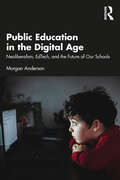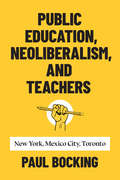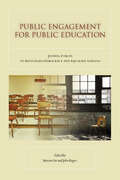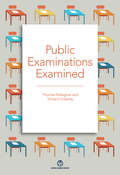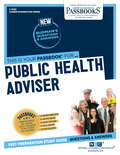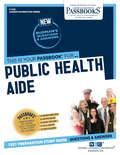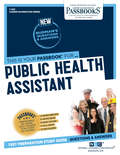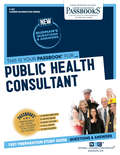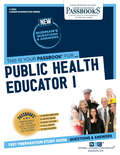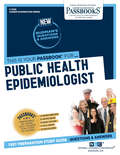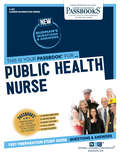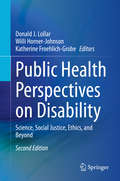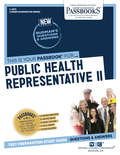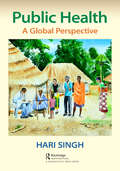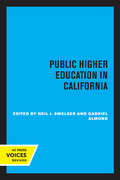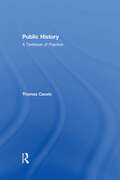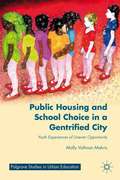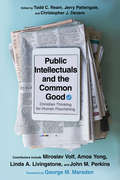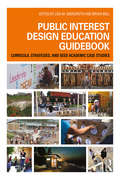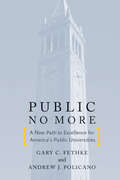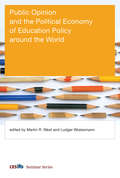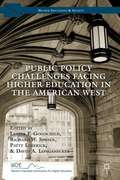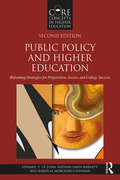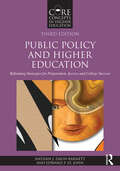- Table View
- List View
Public Education in the Digital Age: Neoliberalism, EdTech, and the Future of Our Schools
by Morgan AndersonEducational technology is now ubiquitous in schooling, both in P-12 and at universities. Despite the imposition of technology in most aspects of teaching and learning, little attention has been given to the implications educational technology has for healthy student development, humane pedagogy, teacher labor, academic freedom, and the aims of social justice. Rather than merely a set of neutral tools, educational technology is bound up with systems of power and privilege that tend to deepen, rather than confront inequality. In calling for a reassessment of the relationship between schools and technology, this book asks readers to think differently about the role technology can serve in socially just schools. An accessible and compelling read, this book will appeal to students and scholars of sociology, social justice, politics, and all those interested in the impact technology is having on the education system in the USA.
Public Education, Neoliberalism, and Teachers: New York, Mexico City, Toronto
by Paul BockingFrom pressure to "teach to the test" and the use of quantitative metrics to define education "quality," to the rise of "school choice" and the shift of principals from colleagues to managers, teachers in New York, Mexico City, and Toronto have experienced strikingly similar challenges to their professional autonomy. By visiting schools and meeting teachers, government officials, and union leaders, Paul Bocking identifies commonalities that are shaping how teachers’ work and public schools function. While arguing that neoliberal education policy is a dominant trend transcending the realities of school districts, states, or national governments, Bocking also demonstrates the importance of local context to explain variations in education governance, especially when understanding the role of resistance led by teachers’ unions.
Public Engagement for Public Education: Joining Forces to Revitalize Democracy and Equalize Schools
by John Rogers Marion OrrCommunity participation plays a large role in the success or failure of our public schools. This book focuses attention on the problem of inequality in public engagement, considering how race, class, ethnicity, language, and immigration status shape opportunities for engagement. Without the active participation of the public, chances for improving school systems are limited. Without equal opportunity for public engagement, those in the lower reaches of stratified society are left largely on the outside looking in-and that all too easily becomes a self-perpetuating cycle. Public Engagement for Public Educationspeaks to the potential for students, parents, community members, and civic leaders to join forces and create more equitable schooling. Such engagement can expand access to quality educational pathways which in turn paves the way to a stronger voice in society and the promise of the American dream. If segments of society are blocked access to those pathways, the book argues, nothing less than the health of American democracy is at stake.
Public Examinations Examined
by Thomas Kellaghan Vincent GreaneyHigh-stakes public examinations exert a dominant influence in most education systems. They affect both teacher and student behavior, especially at the middle and upper levels of secondary education. The content of past examinations tends to dictate what is taught and how it is taught and, more important, what is learned and how it is learned. By changing aspects of these examinations, especially their content and format, education systems can have a strong positive impact on teacher behavior and student learning, help raise student achievement levels, and better prepare students for tertiary-level education and for employment. Examination agencies, many of which have followed the same procedures over decades, can learn from the successes and failures of other systems. This book addresses current issues related to the development, administration, scoring, and usage of these high-stakes public examinations, identifying key issues and problems related to examinations in many emerging market economies as well as in advanced economies. The book’s primary audience consists of public examination officials on national, regional, and state examination boards, but the book should also be of interest to senior education policy makers concerned with certification and learning achievement standards, to academics and researchers interested in educational assessment, to governmental and education agencies responsible for student selection, and to professionals at development organizations. “This extremely well-written and comprehensive book offers a timely review of the diversity of public examination practices worldwide; of the tensions between examinations and learning; and of the technical expertise involved in the creation of valid, reliable, and fair assessments. It reminds us that as “the diploma disease†? takes hold with an ever-greater intensity at every stage of education worldwide, and the commercial business of testing flourishes, those concerned with educational quality and meaningful learning must be on guard to prevent the assessment tail wagging the educational dog.†? Angela W. Little, Professor Emerita, Institute of Education, University College London “This book is very well structured and written and draws on the authors’ remarkable global knowledge across countries and histories. It will be a great asset both to administrators responsible for examinations and to academics and other professionals who seek to understand the nature and impact of examinations of different types and in different settings.†? Mark Bray, UNESCO Chair Professor of Comparative Education, University of Hong Kong; and former Director, UNESCO International Institute for Educational Planning “I am sure that Public Examinations Examined, which thoroughly analyzes the practice of public examinations in different countries and makes profound and well-grounded conclusions, will arouse very great interest and will serve to further improve public examinations.†? Victor Bolotov, Distinguished Professor, Higher School of Economics, National Research University, Moscow; member, Russian Academy of Education; and former Deputy Minister of Education, Russian Federation
Public Health Adviser: Passbooks Study Guide (Career Examination Series)
by National Learning CorporationThe Public Health Adviser Passbook® prepares you for your test by allowing you to take practice exams in the subjects you need to study. It provides hundreds of questions and answers in the areas that will likely be covered on your upcoming exam, including but not limited to; Communicable disease control, public health, and human behavior; Interviewing and investigation techniques; Preparing and understanding statistical charts; and more.
Public Health Aide: Passbooks Study Guide (Career Examination Series)
by National Learning CorporationThe Public Health Aide Passbook® prepares you for your test by allowing you to take practice exams in the subjects you need to study. It provides hundreds of questions and answers in the areas that will likely be covered on your upcoming exam, including but not limited to; Assisting patients; Clerical operations with letters and numbers; Alphabetizing; and more.
Public Health Assistant: Passbooks Study Guide (Career Examination Series #C-629)
by National Learning CorporationThe Public Health Assistant Passbook® prepares you for your test by allowing you to take practice exams in the subjects you need to study. It provides hundreds of questions and answers in the areas that will likely be covered on your upcoming exam, including but not limited to; Record keeping and office procedures; Knowledge of terms and equipment used in clinics or other health centers; Judgement; Ability to follow instructions; Sanitation and storing methods; and more.
Public Health Consultant: Passbooks Study Guide (Career Examination Series)
by National Learning CorporationThe Public Health Consultant Passbook® prepares you for your test by allowing you to take practice exams in the subjects you need to study. It provides hundreds of questions and answers in the areas that will likely be covered on your upcoming exam, including but not limited to: public health issues and practices; interviewing and counseling; understanding and interpreting written material; preparing written material; supervision; and more.
Public Health Educator I: Passbooks Study Guide (Career Examination Series)
by National Learning CorporationThe Public Health Educator I Passbook® prepares you for your test by allowing you to take practice exams in the subjects you need to study. It provides hundreds of questions and answers in the areas that will likely be covered on your upcoming exam, including but not limited to; Basic concepts and common practices in the design and implementation of programs for directing or changing the behavior of certain target groups; Behavioral science concepts related to public health education; and more.
Public Health Epidemiologist: Passbooks Study Guide (Career Examination Series)
by National Learning CorporationThe Public Health Epidemiologist Passbook® prepares you for your test by allowing you to take practice exams in the subjects you need to study. It provides hundreds of questions and answers in the areas that will likely be covered on your upcoming exam, including but not limited to; Incidence, control and prevention of infection diseases; Methods of control; Environmental and epidemiological control measures; and more.
Public Health Nurse: Passbooks Study Guide (Career Examination Series)
by National Learning CorporationThe Public Health Nurse Passbook® prepares you for your test by allowing you to take practice exams in the subjects you need to study. It provides hundreds of questions and answers in the areas that will likely be covered on your upcoming exam, including but not limited to: administer routine screening tests; interpret, evaluate and report results; counsel patients on results, tests, treatment and medication; maintenance of medical charts and records of patients; ablility to teach patients and family about nutrition, hygiene, prevention, rehabilitation and community resources; report writing; and other related areas.
Public Health Perspectives on Disability: Science, Social Justice, Ethics, and Beyond
by Donald J. Lollar Willi Horner-Johnson Katherine Froehlich-GrobeIn this new edition, the editors and contributors update and expand on the educational framework that was introduced in the first edition for rethinking disability in public health study and practice and for attaining the competencies that should accompany this knowledge. The second edition highlights key areas of research that have emerged since the first edition was published. This edition includes new and updated chapters that have particular relevance for public health practice: Disability, Intersectionality, and Inequity: Life in the MarginsDisability and Health Programs: Emerging PartnersChildren with Special Healthcare NeedsDisasters and Disability: Rhetoric and RealityInter-relationship of Health Insurance and Employment for People with DisabilitiesPublic Health, Work, and DisabilityActions to Prepare a Competent Workforce Public Health Perspectives on Disability: Science, Social Justice, Ethics, and Beyond, 2nd Edition, is an essential resource for public health educators and practitioners as well as students in graduate schools of public health throughout the United States.
Public Health Representative II: Passbooks Study Guide (Career Examination Series #C-2973)
by National Learning CorporationThe Public Health Representative II Passbook® prepares you for your test by allowing you to take practice exams in the subjects you need to study. It provides hundreds of questions and answers in the areas that will likely be covered on your upcoming exam, including but not limited to; Communicable disease and control techniques; Interpretation of tables and graphs, including statistical computations; Preparing written material; Understanding and interpreting written material; Public and community relations; and more.
Public Health: A Global Perspective
by Hari SinghPublic health is the science and art of improving the health and well-being of communities. Public health interventions go beyond individual healthcare to focus on preventing diseases and injuries, promoting healthy behaviors, and addressing sociocultural, economic, and environmental factors that impact health.While topics of public health, such as maternal health, child health, and epidemiology of infectious and noncommunicable diseases, require familiarity with clinical terms and concepts, the author demystifies medical knowledge to make it accessible to a wider audience. Challenges faced by low-income countries, as well as success stories from developed nations, are included to make the book relevant for global readers.With a focus on essentials and priority issues, the author employs simple and straightforward language to present situational cases that shed light on global public health challenges and possible interventions. To stimulate analytical thinking and encourage readers to approach the subject with scientific rigor, concepts and facts are substantiated with their background, rationale, or application. Readers should be able to relate learnings with their field experience.While this book is primarily for public health practitioners, including community health nurses and physicians, social workers, and health managers, it may be a valuable resource for anyone interested in public health and its application in creating healthier societies.
Public Higher Education in California
by Neil J. Smelser Gabriel AlmondThis title is part of UC Press's Voices Revived program, which commemorates University of California Press’s mission to seek out and cultivate the brightest minds and give them voice, reach, and impact. Drawing on a backlist dating to 1893, Voices Revived makes high-quality, peer-reviewed scholarship accessible once again using print-on-demand technology. This title was originally published in 1974.
Public History: A Textbook of Practice
by Thomas CauvinPublic History: A Textbook of Practice is a guide to the many challenges historians face while teaching, learning, and practicing public history. Historians can play a dynamic and essential role in contributing to public understanding of the past, and those who work in historic preservation, in museums and archives, in government agencies, as consultants, as oral historians, or who manage crowdsourcing projects need very specific skills. This book links theory and practice and provides students and practitioners with the tools to do public history in a wide range of settings. The text engages throughout with key issues such as public participation, digital tools and media, and the internationalization of public history. Part One focuses on public history sources, and offers an overview of the creation, collection, management, and preservation of public history materials (archives, material culture, oral materials, or digital sources). Chapters cover sites and institutions such as archival repositories and museums, historic buildings and structures, and different practices such as collection management, preservation (archives, objects, sounds, moving images, buildings, sites, and landscape), oral history, and genealogy. Part Two deals with the different ways in which public historians can produce historical narratives through different media (including exhibitions, film, writing, and digital tools). The last part explores the challenges and ethical issues that public historians will encounter when working with different communities and institutions. Either in public history methods courses or as a resource for practicing public historians, this book lays the groundwork for making meaningful connections between historical sources and popular audiences.
Public Housing and School Choice in a Gentrified City
by Molly Vollman MakrisWinner of the 2016 AESA Critics' Choice Book Award Molly Makris uses an interdisciplinary approach to urban education policy to examine the formal education and physical environment of young people from low-income backgrounds and demonstrate how gentrification shapes these circumstances.
Public Intellectuals and the Common Good: Christian Thinking for Human Flourishing
by Todd C. Ream Jerry A. Pattengale Christopher J. Devers Christopher J. Devers, Jerry A. Pattengale, Todd C. ReamMiroslav VolfAmos YongLinda A. LivingstoneHeather Templeton DillKatelyn BeatyEmmanuel KatongoleJohn M. Perkins and David Wright
Public Interest Design Education Guidebook: Curricula, Strategies, and SEED Academic Case Studies (Public Interest Design Guidebooks)
by Lisa M. Abendroth Bryan BellPublic Interest Design Education Guidebook: Curricula, Strategies, and SEED Academic Case Studies presents the pedagogical framework and collective curriculum necessary to teach public interest designers. The second book in Routledge’s Public Interest Design Guidebook series, the editors and contributors feature a range of learning competencies supported by distinct teaching strategies where educational and community-originated goals unite. Written in a guidebook format that includes projects from across design disciplines, this book describes the learning deemed most critical to pursuing an inclusive, informed design practice that meets the diverse needs of both students and community partners. Featured chapter themes include Fundamental Skills, Intercultural Competencies, Engaging the Field Experience, Inclusive Iteration, and Evaluating Student Learning. The book consists of practice-based and applied learning constructs that bridge community-based research with engaged learning and design practice. SEED (Social Economic Environmental Design) academic case studies introduce teaching strategies that reinforce project-specific learning objectives where solving social, economic, and environmental issues unites the efforts of communities, student designers, and educators. This comprehensive publication also contains indices devoted to learning objectives cross-referenced from within the book as well as considerations for educational program development in public interest design. Whether you are a student of design, an educator, or a designer, the breadth of projects and teaching strategies provided here will empower you to excel in your pursuit of public interest design.
Public No More: A New Path to Excellence for America’s Public Universities
by Andrew J. Policano Gary C. FethkePublic No More examines the quickly changing environment within higher education, including the permanent decline in state support for public universities. This book raises the question of how research universities can survive with reduced subsidies and increased competition from both non-profit and growing for-profit institutions. Authors Gary C. Fethke and Andrew J. Policano, both longtime university administrators, offer a strategic framework for determining how tuition and access should be set and how universities should decide on quality and program scope. Throughout the text, real-world examples illustrate successful and unsuccessful adoptions of the authors' proposals. Leadership within public higher education, policymakers, and researchers alike will find Public No More to be a sober and well-grounded guide to what lies ahead for universities across the nation.
Public Opinion and the Political Economy of Education Policy around the World (CESifo Seminar Series)
by Martin R. West and Ludger WoessmannComparative analyses of the influence of public opinion on education policy in developed countries.Although research has suggested a variety of changes to education policy that have the potential to improve educational outcomes, politicians are often reluctant to implement such evidence-based reforms. Public opinion and pressure by interest groups would seem to have a greater role in shaping education policy than insights drawn from empirical data. The construction of a comparative political economy of education that seeks to explain policy differences among nations is long overdue. This book offers the first comparative inventory and analysis of public opinion and education in developed countries, drawing on data primarily from Europe and the United States.
Public Policy Analysis, M.A. Final Politics/Public Administration Paper-II Readings, SDE, AU
by Dr K. Ramachandhra Murthy D. Venketswar RaoThis is the prescribed text book for students pursuing MA Public Administration at School Of Distance Education for the Final year paper-2, for the subject named Public Policy Analysis.
Public Policy Challenges Facing Higher Education In The American West
by Lester F. Goodchild Richard W. Jonsen Patty Limerick David A. LonganeckerPublic Policy Challenges Facing Higher Education in the American West is the first regional public policy study of American higher education. Presidents of the Western State Commission for Higher Education and the National Center for Higher Education Management Systems, alongside nationally recognized policy analysts and current western campus presidents, provosts, and administrators, tackle seven key public policy issues facing postsecondary education in the American West: student access, federal research funding, state governance, state financing, state appropriations and their relationship to institutional tuition, distance education and technology, and the role of community colleges. These analysts, researchers, and administrators offer a clear and complete analysis of the facts of each policy situation, the public policy options, and their connections to state and university relationships. Fifteen western states, including Alaska, California, and Hawaii, comprise the expansive region under discussion. With its companion volume, Higher Education in the American West: Regional History and State Contexts, this book is essential reading for higher education policymakers, scholars, and anyone who wants to know what the relationship between states and universities in the West has been and where it is going.
Public Policy and Higher Education: Reframing Strategies for Preparation, Access, and College Success (Core Concepts in Higher Education)
by Nathan Daun-Barnett Edward P. St. John Karen M. Moronski-ChapmanPublic Policy and Higher Education provides readers with new ways to analyze complex state policies and offers the tools to examine how policies affect students’ access and success in college. Rather than arguing for a single approach, the authors examine how policymakers and higher education administrators can work to inform and influence change within systems of higher education using research-based evidence along with consideration of political and historical values and beliefs. Raising new questions and examining recent developments, this updated edition is an invaluable resource for graduate students, administrators, policymakers, and researchers who seek to learn more about the crucial contexts underlying policy decisions and college access. Special Features: Case Studies—allow readers to examine strategies used by different types of colleges to improve access and retention. Reflective Exercises—encourage readers to discuss state and campus context for policy decisions and to think about the strategies used in a state or institution. Approachable Explanations—unpack complex public policies and financial strategies for readers who seek understanding of public policy in higher education. Research-Based Recommendations—explore how policymakers, higher education administrators, and faculty can work together to improve quality, diversity, and financial stewardship. New epilogues and a revised Part III—reexamine themes and encourage critical thinking about inequality and policy change
Public Policy and Higher Education: Reframing Strategies for Preparation, Access, and College Success (Core Concepts in Higher Education)
by Edward P. St. John Nathan J. Daun-BarnettPublic Policy and Higher Education, third edition, provides readers with the tools to examine how policies affect students’ access and success in college. Rather than arguing for a single approach, the authors use research-based evidence and consider political and historical values and beliefs to examine how policymakers and higher education administrators can inform and influence change within systems of higher education. Raising new questions and examining recent developments, this fully updated edition is an invaluable resource for graduate students, administrators, policymakers, and researchers who seek to learn more about the crucial contexts underlying policy decisions and college access. This third edition includes updates across the board to reflect current policy contexts. Expanded historical frameworks allow readers to better understand the preparation, access, persistence, and the development of state education systems. New considerations of state and national political ideologies help to inform contemporary contexts. Finally, refreshed cases, including an additional case about Florida and updated cases for California, Minnesota, Indiana, and North Carolina, equip readers with new ways to analyze complex state policies and their impact on higher education.Special Features: Case Studies help readers to build their skills in analyzing how political values, beliefs, and traditions influence policy decisions and adaptations within state systems. Reflective Questions encourage readers to discuss state and campus contexts for policy decisions and to consider the strategies used in a state or institution. Approachable Explanations unpack complex public policies and financial strategies for readers who seek an understanding of public policy in higher education. Research-Based Recommendations explore how policymakers, higher education administrators, and faculty can work together to improve quality, diversity, and financial stewardship.
